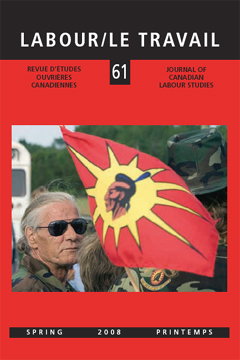Abstract
IN THE 1950S AND 1960S, Aboriginal gillnet fishers protested new state salmon regulations restricting access to the industrial fishery of the Nass and Skeena Rivers in northern British Columbia. Using cannery records, as well as letters, petitions, and statements native people made to the Department of Fisheries, this article examines both the protests and the impact of the regulations that the state introduced in a time of massive structural, economic, technological, and ecological change in the northern fishery. The native fishers’ letters suggest that both their Aboriginal heritage and work-centered, class-based identities were shaping their opposition to the state. Those leading the protests were active in other areas of native politics, but also strongly identified as gillnetters, small-boat fishers in an increasingly stratified and competitive fishery. Moreover, native fishers in British Columbia had had a long history of labour activism and organization. This article suggests that understanding the ways these Aboriginal groups navigated between both the colonial and capitalist legacies can provide insights into native politics and experiences in this period.
